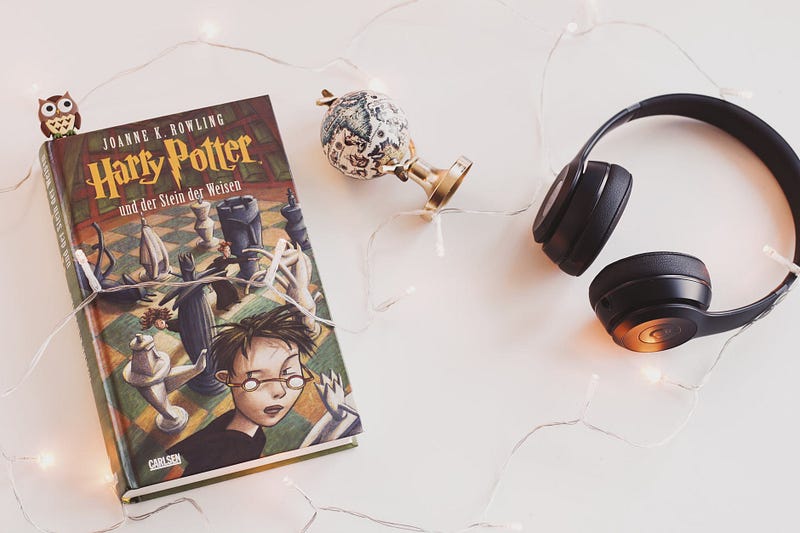Does Supporting the LGBTQ+ Community Mean I Should Hate Harry Potter?
Not mixing the art & the artist

Mixing the art & the artist
One of the major reasons I’m such an avid reader today is because I discovered the Harry Potter series at an early age. Without the books, I might not have learned the agony of patiently waiting for a book to arrive in the bookstores. Or the thrill of discussing plot twists with classmates. And the comfort of analysing fictional characters and obsessing over book details for hours.
My childhood wasn’t easy. Harry Potter helped me through a lot of dark times.
I identified with how Harry never had any friends in the Muggle world. How he often used his invisibility cloak because he didn’t want to draw attention to himself. At my loneliest, I used to console myself saying, “Maybe the reason I don’t fit anywhere is that I’m a witch too, and I haven’t yet received my Hogwarts letter.”
I had this connection with the series all through my life. Which is why the author’s continued insensitivity to the trans community hurts me on such a personal level.
Over the past few years, JK Rowling has made several statements that suggest strongly at her brand of trans-exclusionary radical feminism (TERFism) — the belief that trans women aren’t women and that biological sex is the only factor that determines a person’s gender.
But this is 2020. There is no valid excuse for targeting trans people.
The author’s comments have caused an uproar among the LGBTQ+ community and have led to a series of sessions where the Harry Potter books have been publicly burned.
I had been vocal on my Instagram stories about why and how JK Rowling is wrong but had never made a comment about hating Harry Potter. However, I was pulled into this controversy recently when a friend called me out on a Harry Potter-related video I’d made.
This article is my attempt to convey why it’s not so hard for me to separate the art from the artist. It might read like it’s all over the place. But that’s because my feelings are conflicted and all over the place. This article might be a rant, but if you have loved Harry Potter as a child, you might resonate with my words.
Before we get started, here are a few facts to keep in mind:
- I don’t think Harry Potter is the best YA fantasy fiction to have ever been released. In fact, now that I have read so many more books, I think Rowling’s world-building is mediocre at best, something I might not have bothered to continue had I started reading them as an adult.
- I have read and reviewed a whole bunch of books written by queer authors featuring queer characters. In fact, the best fictional work I read in 2020 was about a pack of gay werewolves.
- The only reason Harry Potter is so special to me is that I’m of the generation that grew up with Harry and his friends.
The Story Started from YouTube
A few days back, I posted a video on my YouTube channel about what it’s like to re-read Harry Potter as an adult. After watching it, a person with whom I’d been friends with for over a year reached out on Instagram and said this —
“I have always thought you’re a huge ally for queer folks. And then you turn around and make a 15-minute video appreciating JKR for her genius after all this time of me being vocal about how continuing to give JKR a platform is hurtful to the trans community? Are you freaking kidding me?”
Not just this, they attacked me, saying I had made “the single most insensitive thing that not only makes them uncomfortable but legitimately fucks with trans people’s mental health.”
I was close to tears on reading their message.
Firstly because I had considered them to be a friend, I didn’t expect them to be so rude to me as if I was the one making transphobic comments.
And secondly, I made sure to include a segment in my video about how I vehemently disagree with JK Rowling’s actions towards the LGBTQ+ community, and that the content is only about how my views as a reader have changed. Apparently, this wasn’t enough.
Apparently, I’d made something that fucked with trans people’s mental health.
Cancel Culture and why it Might Not Be the Only Way
My friend was triggered because they had spent a lot of time asking their followers not to give JK Rowling another platform. They believe that it’s okay to enjoy Harry Potter as long as you’re doing it alone. The moment you post about it on social media, it’s as if you are adding your voice in support of Rowling’s (which, in effect, means adding your voice against the trans community).
But is cancel culture the only way to show my support to the trans community?
If you’re not familiar with the term, cancel culture, according to dictionary.com, is defined as:
“The popular practice of withdrawing support for (canceling) public figures and companies after they have done or said something considered objectionable or offensive. Cancel culture is generally discussed as being performed on social media in the form of group shaming.”
Here is my primary concern: Can’t we dislike/disagree with the author, but continue to love Harry Potter?
The Weight of Choices
The parts I valued the most in the Harry Potter novels were the ones that shone with honesty.
The depiction of fierce loyalty among friends gave me hope. That even if I haven’t found my tribe yet, there will be someone for me soon enough. Maybe I’d need to go to a different school, but all isn’t yet lost.
The idea that love is stronger than any magic helped me go to sleep with a smile on my face. It reinforced that as long as you have people who genuinely love you, you don’t have to fight your demons alone.
Harry Potter taught me that committing genocide alone doesn’t make one evil. Prejudice and oppression are just as wrong. Even though Voldemort was the strongest, he wasn’t the only villain Harry faced. Dolores Umbridge, who believed in the importance of blood purity, was the one he had to fight the hardest against.
The books also taught me that the circumstances of their lives don’t determine a person’s value. Yes, Lupin is a werewolf, but he is kind, compassionate, and the best DADA teacher Harry ever had. Yes, Hagrid is a half-giant, but he is one of Harry’s closest friends.
Here, I’m leaving you with a quote by Albus Dumbledore from Harry Potter and the Chamber of Secrets to ponder over:
“It is our choices, Harry, that show what we truly are, far more than our abilities.”
It’s heartbreaking what Rowling’s choices have revealed about her.
But what does my choice of continuing to love Harry Potter reveal about me?
Doing Your Bit to Support the Trans Community
According to The National Center for Transgender Equality, here are the ways one can be an ally to the community:
- Use the language/pronouns a transgender person uses for themselves. If you don’t know what pronouns they prefer, it’s okay to ask.
- Be careful and considerate about what other questions you ask and make sure they aren’t uncomfortable or feel compelled to answer.
- Avoid compliments or advice based on stereotypes about transgender people, or about how men and women should look or act.
- Speak out in support of transgender people and transgender rights.
- Think about how you use gendered language (avoid using generalisations like “Ladies and gentlemen” or referring to everyone as “guys”).
As this post suggests, the transgender community is diverse and complex. Different members have different needs and priorities. There is no one way to be a ‘perfect’ ally.
Be respectful, do your best, and keep trying.
And if you can be respectful while liking Harry Potter, then so be it. At least, that’s what I tell myself.



For book reviews and recommendations, follow me on Goodreads.
Join my email list to get a thought-provoking story for FREE every week!
